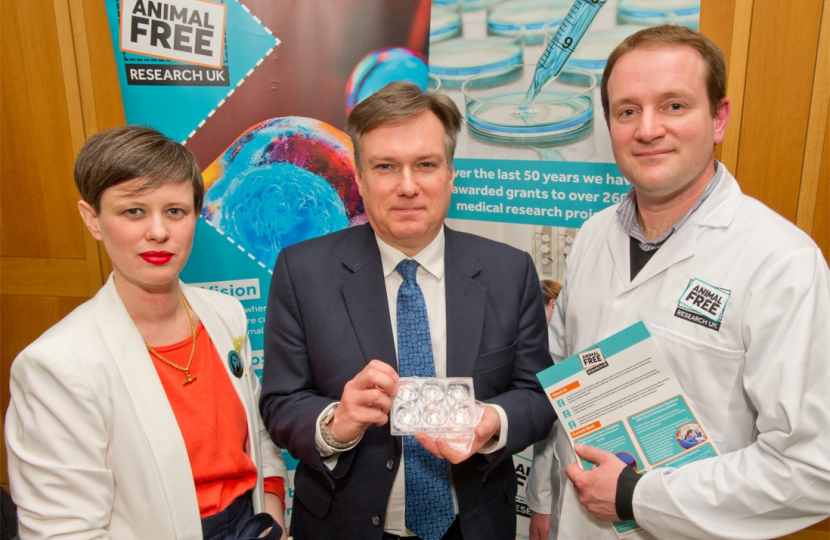
Henry Smith MP has hosted Animal Free Research in Parliament (on Wednesday, 16th March) to help showcase how cutting-edge medical technology is transforming the search for cures and treatments for human diseases.
The event included Animal Free Research UK-funded scientist Dr Adrian Biddle and early career researcher Alice Scemama from Queen Mary University London, who demonstrated to MPs how New Approach Methodologies in laboratories – known as NAMs – like organ on a chip are greatly improving new drug discovery processes.
Henry said;
“Drug development is notoriously slow and expensive – it can take up to 10 years and cost more than £1 billion to bring a new compound from the lab to market. A major cause of this inefficiency is the traditional reliance on testing drugs in animals before they are tested in humans.
“Animals often don’t accurately reflect human physiology, meaning that drugs which appear to be safe and effective in animals frequently turn out to be harmful or ineffective in humans. This mismatch in biology causes many ineffective or toxic drugs to advance through clinical trials at great expense, while potentially effective compounds never make it to market.
“As parliamentary colleagues and I learnt there are better ways to model human biology and diseases, and these give the accurate data needed to accelerate the development of new drugs and personalised medicine.
“Dr Biddle and his colleague also demonstrated how the UK is well placed to become a global science superpower and with the right investment and government support, can lead in this vital, innovative and ethical work.”
Animal Free Research UK works to highlight the need for a central role for human relevant science in the country’s post-Covid research and innovation strategy, and recommends the creation of a dedicated ministerial-level post to ‘lead an ambitious and detailed programme of work’ cutting across Government to drive the UK’s transition to human relevant science.
Carla Owen, CEO of Animal Free Research UK, said;
“MPs have seen first-hand how modern medical research methods are transforming our quest for better medicines and health – and why Britain has good reason to be proud of being a centre of excellence for science.
“They also learned how genetics and physiology between humans and animals greatly differ, and why we must not be left behind by relying on outdated animal experiments if we are to secure our international reputation as a science superpower.
“Britain must embrace the high-tech alternatives to animal testing. Government must provide supportive infrastructure, funding, education and training, and regulations that enable human relevant research. Because accelerating human relevant life sciences is good for human health, good for animals and good for the UK economy.”
Picture: Henry Smith MP holding an example of a 3D organ on a chip, a cutting edge new approach method used in medical research. He is pictured next to CEO of Animal Free Research UK Carla Owen (left) and Queen Mary University London cancer research scientist Dr Adrian Biddle. Photo Credit AFRUK/Andrew Parsons)


